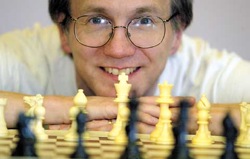This week the World Championship Candidates’ Matches got underway in Kazan, Russia. Once upon a time the candidates’ matches were marathons: 12 games in the quarterfinals, 12 in the semifinals, 24 games in the finals. They took a year or more to complete. Now, in the era of instant gratification chess (sudden-death time controls, Armageddon playoffs, bullet chess, etc.) the whole thing will be done in a month. The quarter-final and semifinal matches will be 4 games each, and the final will be 6 games. This is truly the World Championship Lite.
However, Greg Shahade points out in the comments to his article, Handicapping the Candidates, that the highly abridged knockout format has parallels in other sports: for example, basketball. You could compare the old system to the NBA championship, where all of the playoff rounds are best-of-seven and upsets are fairly uncommon. By contrast, the NCAA is all about upsets. Which one is a better event? Well, different people may have different opinions, but in my book it’s not even close — the NCAA tournament (aka “March Madness”) is absolutely my favorite sporting event of the year, in any sport.
So I guess that, for consistency, I should like the new Candidates’ format. Let the May Madness begin!
So far, three rounds of the quarter-finals have been completed, and indeed there is one major upset brewing. Here are the results so far:
Gata Kamsky 2, Veselin Topalov 1. (Gata won game 2 as Black.)
Boris Gelfand 2, Shakhriyar Mamedyarov 1. (Gelfand won game 3 as Black.)
Vladimir Kramnik 1½, Teimour Radjabov 1½. (All draws so far.)
Levon Aronian 1½, Alexander Grischuk 1½. (All draws so far.)
First of all, let’s hear it for Black! So far the players of the Black pieces are undefeated and have a 7-5 combined score. There have been no boring Petroffs or Berlin Defenses, and the sharp Najdorf Sicilian has made its appearance in four games.
Second, let’s hear it for Kamsky! Nobody seemed to give him much of a chance against Topalov, perhaps because Topalov beat him in their 2009 match in Sofia. But I think they were overlooking how sharp that match was and how miraculous Topalov’s victory was in the seventh and deciding game. Kamsky could easily have won that game, and then they would have gone to game eight with the match tied and Kamsky having White.
Another factor that people might have overlooked, as Sergei Shipov points out in his commentary, is that Kamsky was the only one of the eight participants who played in a tournament right before this one. (Kamsky won the U.S. Championship less than 2 weeks ago.) Everybody else was sitting at home, preparing opening novelties and staring at their computer screens instead of actually playing. There’s something to be said for getting the competitive juices going. Shipov notes that Anatoly Karpov, for example, was never shy about playing in tournaments both before and after his big matches.
Finally, here’s a third (perhaps slightly superstitious) reason not to be surprised by Kamsky’s success. Could this be the Year of the American in chess? Earlier this year we had Hikaru Nakamura winning the super-tournament in Wijk aan Zee, which Garry Kasparov called the biggest tournament win for an American since Harry Nelson Pillbury won Hastings in 1895! So naturally Kamsky has to try to do him one better.
Again, there is an analogy with other sports. Have you ever noticed how success seems to be contagious — when a city has one sports champion, suddenly its other sports teams start doing well, too? The prime example, for me, was New York in 1969, when the Jets stunned the Colts in the (U.S. football) Super Bowl, and the Mets came out of nowhere to win the (baseball) World Series, and the Knicks won the (basketball) NBA championship. Another example was Boston in 2004, with the Patriots winning the Super Bowl and the Red Sox breaking their 86-year jinx to win the World Series.
OK, so maybe it doesn’t happen that often, but as the Russians say, “redko no metko.” (“Few but well-aimed.”)
So hopefully the Year of the American in international chess will continue! I predict that Kamsky will defeat Topalov, Gelfand, and Aronian, in that order, to win the “May Madness” and earn the right to challenge Viswanathan Anand for the World Championship.
P.S. If any of you are wondering why I’m not translating Sergei Shipov’s online commentaries this time around… The reason is that I’ve just come out of a very busy period for my work. I thought very hard about doing the translations, but in the final analysis I just wanted to appreciate having a little bit of spare time for a change. The good news is that “MishaNP” at www.chessintranslation.com is translating all of Shipov’s commentaries, so you don’t have to miss a bit of his witty and insightful analysis. In some ways that is a more appropriate venue than this blog, because it is a site that is entirely devoted to translating Russian chess columns. However, having said that, I do hope to translate more of Shipov’s work in the future. Especially if the future includes a Kamsky-Anand match!
P.P.S. Sorry about the loss of my normal formatting for this blog, which has led to the substitution of a generic background. Something strange is going on with my site, and I will probably have to update to a new version of WordPress (which may also force me to change the appearance).


